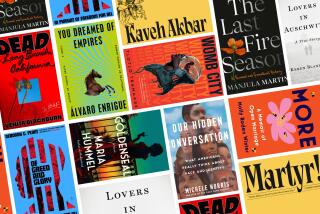‘The Power of Half’ by Kevin and Hannah Salwen
- Share via
The Power of Half
One Family’s Decision to Stop
Taking and Start Giving Back
Kevin and Hannah Salwen
Houghton Mifflin Harcourt: 242 pp., $24
Give it up for the Salwen family. Inspired by 14-year-old Hannah, who had “become increasingly upset about the imbalance of opportunities in the world,” the family sold their 6,500-square-foot Atlanta home and donated half of the profits from the sales price to alleviate poverty in two dozen villages in Ghana (a place they had never been). The Salwens had been drifting apart, and this new project brought them closer. In the process of learning to discuss global issues and making decisions about how and whom to help, the Salwens also learned how to talk with each other about their lives. The authors -- Hannah and her father, Kevin -- hope the book inspires other families to give half: not necessarily to sell their home but, say, to watch half the amount of television and spend the time saved volunteering. You feel lighter reading this book, as if the heavy weight of house and car and appliances, the need to collect these things to feel safe as a family, are lifted and replaced by something that makes much more sense.
The New Frugality
How to Consume Less, Save More, and Live Better
Chris Farrell
Bloomsbury: 240 pp., $26
Chris Farrell, like many other recession-watchers, points out that being frugal is often synonymous with being green. Here’s the good news: Being frugal is not synonymous with being cheap. Buy the good bike, the low-energy-use appliance; they’re better made and will last longer. Just don’t be reckless, with your life or your habitat. “The New Frugality” includes tips on college savings plans, shared home equity, home insurance, investing, borrowing and retirement. It’s full of websites, books and organizations to help the reluctant American channel his inner New Englander. The spirit of our most famous frugalista, Benjamin Franklin, hovers over pages full of practical tips, much like Poor Richard’s Almanack. “ ‘Tis easier,” the original saver wrote, “to suppress the first desire, than to satisfy all that follow it.”
In a Cheesemaker’s Kitchen
Allison Hooper
Countryman Press: 112 pp., $19.95
Allison Hooper, who co-founded the Vermont Butter & Cheese Co. a quarter of a century ago, was one of the first people to bring artisanal cheesemaking back to the United States. For years, cheesemakers looked to Europe for recipes and methods, but Hooper and her partner Bob Reese showed American cheesemakers how to use local ingredients and market their products to local stores and restaurants. Here, Hooper describes the different textures and tastes obtained from various goat and cow species. She describes the cheesemaking process and suggests ways to eat artisanal cheeses, include them in recipes and pair them with wines. The Vermont Butter & Cheese Co. gets its milk from more than 25 family farms, and it is clear from this book that the popular concept of terroir includes more than just ingredients in the soil. The people who raise and care for animals are a vital part of it as well.
The Happiness Project
Or, Why I Spent a Year Trying to Sing in the Morning, Clean My Closets, Fight Right, Read Aristotle, and Generally Have More Fun
Gretchen Rubin
Harper: 302 pp., $25.99
You may not, like this reader, be a fan of optimism, but you can probably relate to Gretchen Rubin’s realization that she was not as happy as she could be. So in this book, Rubin outlines her own peculiar course of self-torture: a new set of resolutions each month (sing more, quit nagging, make time for friends, don’t gossip). Resolutions, she learns, helped her to feel more in control of her life, a crucial element of happiness. “One of our most pressing concerns,” she writes, “should be to discover the laws of our own nature.” That’s an awful lot of navel-gazing, you might protest, but think of the alternative. You might also sympathize with Rubin’s realization that life is short and there’s only so much time in which to become a decent human being before cutting to the deathbed scene. In January of the year she began this project, she focused on vitality. Resolutions? “Go to sleep earlier, Exercise better, Toss, restore, organize, Tackle a nagging task. Act more energetic.” It’s exhausting just to think about. But it is a start.
Salter Reynolds is a critic in Los Angeles.
More to Read
Sign up for our Book Club newsletter
Get the latest news, events and more from the Los Angeles Times Book Club, and help us get L.A. reading and talking.
You may occasionally receive promotional content from the Los Angeles Times.










